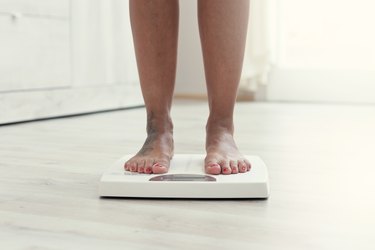
When you start a weight-loss program, seeing results in the first week can be motivating. It's encouraging to see the scale tick down right away. But just how much can you expect to lose in your first week on Weight Watchers, or WW?
The program aims to help you lose 1 to 2 pounds per week, but that's not a cut-and-dry guarantee, especially right off the bat. "The first week of weight loss is quite variable," Gary Foster, PhD, chief scientific officer at WW, tells LIVESTRONG.com.
Video of the Day
Video of the Day
The higher your starting weight, the more you're likely lose, he says. Your weight loss per week on Weight Watchers also depends on the foods you're eating and what your eating and exercise habits were like before coming into the program.
What is clear, though, is that you'll likely lose more weight in the first week, and then your weight loss will slow down a bit. This is all very normal and expected.
Why You May Lose More Weight During the First Week
When it comes to your first week on Weight Watchers, it's hard to predict exactly how your body will respond, but it's likely that you'll lose more weight compared to later weeks. It's also possible that your weight won't budge or you'll see a more mild drop.
When you start a weight-loss program, you reduce your overall food intake, which naturally decreases your carbohydrate intake. As you cut carbs, glycogen is released from your liver and muscles, which takes water along with it, Foster says. The result is water loss.
"Half of weight loss in the first week is water loss," he says. While that may be exciting, the flip side is that you might lose, say 3 to 5 pounds in that first week, and then expect that rate going forward — something Foster says is neither healthy nor feasible.
What's more, week one results on Weight Watchers also depend on what you did in the days before your first diet day. It's the "last meal" mentality, where you eat all your favorite foods out of the belief that you may never have them again.
"You may have extra bloat, food in your GI tract and carbs stored in your body," Charlie Seltzer, MD, a weight-loss physician in Philadelphia, tells LIVESTRONG.com. Because of that, you may see a more dramatic drop in your weight.
Still, "you won't get a true gauge as to your true weight loss until after a couple weeks on a program," Dr. Seltzer says. Even in the first week, you might not see the scale move much.
Cutting calories also elevates levels of the stress hormone cortisol, he says, which can cause water retention. "You might lose fat but not see the scale moving because of this cortisol," Dr. Seltzer explains.
Average Weekly Weight Loss on Weight Watchers
The average weekly weight loss on WW is 1 to 2 pounds per week, according to the company. That's a healthy rate, according to the Mayo Clinic.
Faster weight loss than that after the first week increases the risk of gallstone formation, Foster says. He adds that WW aims for a deficit of 750 calories per day, and your specific calorie goal is based on your estimated metabolic rate and level of physical activity. Cutting more calories than that likely isn't maintainable, which makes your weight more likely to rebound, he notes.
For best results, Dr. Seltzer suggests trying to change as little as possible about what you're eating now to get to your point goal. Then, you can take small steps toward getting to your ideal diet. For example, don't decide to eat only chicken and broccoli for lunch and dinner. Small changes might mean if you're drinking four sodas a day, you'd aim to drink three. If you take cream in your coffee, make it half-and-half.
Also, look at the overall trend of weight loss instead of tracking it day by day. A whole host of factors — like how much water you've been drinking and whether you've gone to the bathroom — can shift your weight a bit. Regularly weigh yourself — provided the results do not have a negative effect on your psyche or how you choose to eat that day — and if your weight doesn't move over the course of two weeks, Dr. Seltzer recommends lowering your points.
What Else to Expect on Your First Week of WW
Foster has some advice for how to succeed when you start WW: "Don't get too preoccupied by weight loss," he says. (Shocking, right?) "There is so much variability in day-to-day weight loss, and the scale will go up and down for reasons that are not logical," he says.
Playing the scale-chasing game is a losing endeavor. What matters most are your healthy behaviors.
Also, self-compassion matters a lot — from the first week on WW forward, says Foster, who's the author of The Shift: 7 Powerful Mindset Changes for Lasting Weight Loss.
"When you start a journey believing that you have a flaw to fix or that you're undisciplined, that's a position of weakness. It's important to believe that you're worth taking care of," he says."Your weight-loss journey shouldn't feel punitive."